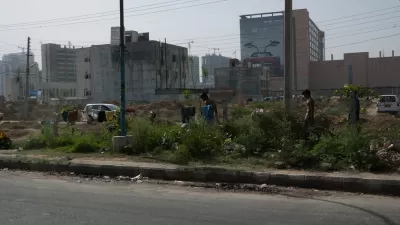Ernest Harsch interviews UN-Habitat Director Joan Clos on the challenges facing African cities in an age of unprecedented urbanization, from the abundance of slums to the threat of natural disasters.
The problems attendant to rapid urbanization in Africa today are by no means new. Overcrowding of slums, failing infrastructure, and stunted economic development are the hallmarks of mass migrations out of the countryside and into the city. But with a projected urban population of 1.2 billion by 2050, the scale and speed of Africa's current predicament will require a new, more expedient approach to urban planning across the continent.
As urban populations skyrocket, for instance, many policies obsolesce even before they can make it through the bureaucratic framework. "The only solution is to speed up the planning process," says Clos, "because you cannot stop in-migration. If it's complex because it involves different ministries, it needs to be simplified. And if it's too dependent on central government, then it should be delegated to the local authorities."
Clos also points to the dangers that unplanned cities face with respect to natural disasters, on the rise in recent years due to accelerating climate change: "These are now typically considered to be natural disasters. But in the future they will be seen as a failure of government... We have seen earthquakes with very high tolls of victims, and similar... stronger, earthquakes elsewhere, with very few victims. The natural disaster, the quake, is the same. What is different is the outcome. "
"There are many examples (of good planning) in Africa," he points out, "but mostly at the small scale. They are not perfect, but are advancing in a good direction, in Morocco, Mauritius, Rwanda. What we still don't see is a pro-active approach, of national governments developing national urban policies to cope with the challenging future of African cities."
FULL STORY: Africa faces nightmare of urban sprawl

Maui's Vacation Rental Debate Turns Ugly
Verbal attacks, misinformation campaigns and fistfights plague a high-stakes debate to convert thousands of vacation rentals into long-term housing.

Planetizen Federal Action Tracker
A weekly monitor of how Trump’s orders and actions are impacting planners and planning in America.

In Urban Planning, AI Prompting Could be the New Design Thinking
Creativity has long been key to great urban design. What if we see AI as our new creative partner?

Cal Fire Chatbot Fails to Answer Basic Questions
An AI chatbot designed to provide information about wildfires can’t answer questions about evacuation orders, among other problems.

What Happens if Trump Kills Section 8?
The Trump admin aims to slash federal rental aid by nearly half and shift distribution to states. Experts warn this could spike homelessness and destabilize communities nationwide.

Sean Duffy Targets Rainbow Crosswalks in Road Safety Efforts
Despite evidence that colorful crosswalks actually improve intersection safety — and the lack of almost any crosswalks at all on the nation’s most dangerous arterial roads — U.S. Transportation Secretary Duffy is calling on states to remove them.
Urban Design for Planners 1: Software Tools
This six-course series explores essential urban design concepts using open source software and equips planners with the tools they need to participate fully in the urban design process.
Planning for Universal Design
Learn the tools for implementing Universal Design in planning regulations.
Appalachian Highlands Housing Partners
Gallatin County Department of Planning & Community Development
Heyer Gruel & Associates PA
Mpact (founded as Rail~Volution)
City of Camden Redevelopment Agency
City of Astoria
City of Portland
City of Laramie




























